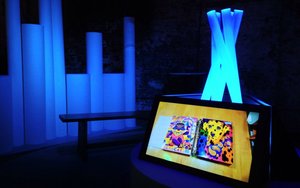CNN Introduces Storytelling Platform, Time Inc. Launches Video Network
- by Felicia Greiff , May 5, 2016

CNN introduced advertisers to its storytelling startup, Great Big Story, and Time Inc announced a new video network to a packed Gotham Hall in New York.
A presentation by CNN president Jeff Zucker included an intro video of a Boy Scout comparing his toolkit to the tools storytellers can use to take their brands "beyond the wilderness of ad blockers."
Zucker said: "Today is not about CNN, and it's not about news or headlines. It's about something different and truly remarkable. It's about the first company we've launched in 35 years that doesn't boast those three little letters the world knows so well."
Great Big Story currently earns more than 40 million monthly video views across platforms, and so far, it's worked with HP and GE. It has plans to launch on Snapchat, Apple News, Roku, Facebook Messenger and others. Some say it's CNN's answer to BuzzFeed's viral, youth-focused content.
Rob Sands, head of distribution and partnerships with Great Big Story, which launched in October, said the company offers creative, intellectual brand integrations.
"The audience today is intelligent enough to know when they're being sold to," Sands said. The company offers brands the option of creating original stories or distributing existing brand stories. Great Big Story is funded by CNN and Turner, but it's editorially independent, Sands said.
Zucker mentioned the network's average viewer age: 27. Is this another Millennial-focused network? No, Sands said. GBS is for anyone who's intellectually curious. Viewers tend to be successful urban dwellers with influence over their peer group and friends.
"They crave knowledge and information," Sands said, adding: "They've got buying power."
Time Inc. Announces Network, VR Series and Data Capabilities
Time Inc.'s NewFront presentation on Thursday morning was packed -- the line wrapped around the block. Celebs including actress Sarah Paulson, former First Daughter Jenna Bush and filmmaker Morgan Spurlock all took the stage to hype the media company's programming.
Announcements included the shows "A Year in Space"; "Dear Basketball," an animated series based on Kobe Bryant's life for Sports Illustrated; a Jenna Bush series with Southern Living called "Southern in the City"; Morgan Spurlock's "EW Pop Docs"; and a virtual reality series from Life.
Time also announced the launch of a People and Entertainment Weekly video network defined by long-form programming, with a built-in audience of 100 million people who read the publications.
Time Inc. digital president Jen Wong said: "Our brands are trusted and they're certainly known to all."
On the topic of the company's acquisition of Viant, Wong said Time Inc can offer advanced data, targeting and measurement, as well as smart TV and mobile insights.
Viant is a joint venture partner of OTT platform startup Xumo, which announced the premiere of 10 premium channel partners: Network A; Reuters; PBS Digital Studios; Bonnier’s Field & Stream, Saveur and Cycle World; Mashable; The Onion and A.V. Club; and Fandor.
"We know what works," Wong said. "Because of this massive content engine, working with us is easy -- turnkey."



Don't you think it's curious, Felicia, that this site doesn't even mention CNN at all on its home page? For a longtime Time Warner watcher, I find it amusing that, when they started online, it was all about their brands. The ridiculous home page of Pathfinder, their first web operation, was nothing but Time Warner logos, as if that was enough. Now, they're launching video channels with no reference to CNN or TW at all. How things change.
"The audience today is intelligent enough to know when they're being sold to," Sands said. Well, no. In a 2015 study by Contently (bit.ly/1G4QHah), "consumers tend to identify native advertising as an article, not an advertisement." The study examined only written articles — I suspect that videos are even harder to identify as native ads because they offer such high entertainment value. This is why the FTC requires publishers to prominently disclose the name of the ad sponsor. Whether you are Buzzfeed, CNN or Great Big Story, the same rules apply (as GBS explains on its cheerfully-worded ad policy greatbigstory.com/adpolicy). "Storytelling" is just the latest name for what we used to call "advertorials." It's way more sophisticated now and it can be very effective when the production quality is high and when the sponsor's brand or product is embedded so deeply in the story that consumers either don't notice or don't care that it's really just another form of paid persuasion.